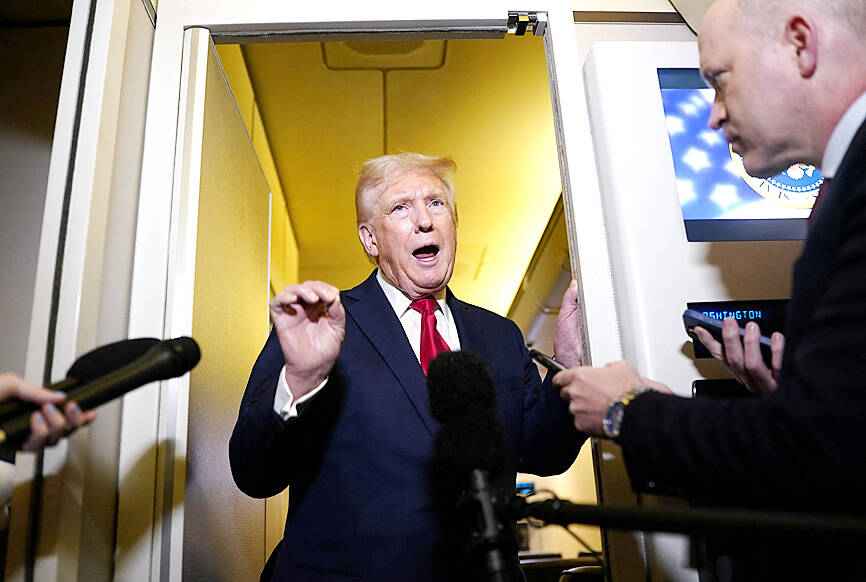Markets yesterday welcomed a US tariffs reprieve for electronics, but US President Donald Trump warned no country would get “off the hook” in his trade war — especially China, while pledging to impose tariffs on semiconductors in the “not distant future.”
While the US on Friday listed tariff exemptions for smartphones, laptops, semiconductors and other electronic products for which China is a major source, Trump and some of his top aides said on Sunday that the exemptions had been misconstrued and would only be temporary as his team pursued fresh tariffs against many items on the list.
“NOBODY is getting ‘off the hook’ ... especially not China which, by far, treats us the worst,” Trump posted on his Truth Social platform.

Photo: Reuters
Chinese President Xi Jinping (習近平) yesterday said that protectionism “will lead nowhere” and a trade war would “produce no winner.”
Shares in Taiwan yesterday closed slightly lower, with initial gains eroded as lingering concerns over the Trump administration’s tariffs on semiconductors continued to hurt market sentiment.
The TAIEX closed down 15.68 points, or 0.08 percent, at 19,513.09, while Taiwan Semiconductor Manufacturing Co (TSMC, 台積電), the most heavily weighted stock on the local market, lost 2.7 percent.
“Investors simply took the money and ran after trimming their holdings in TSMC as the TAIEX rebounded today,” Cathay Futures Consultant Co (國泰證期) analyst Tsai Ming-han (蔡明翰) said. “They fear Trump’s tariffs on semiconductors will bomb the market.”
Other Asian and European stock markets yesterday rallied over the news of Washington’s new exemptions. The Paris, Frankfurt and London stock exchanges were up about 2 percent in morning deals, while Tokyo finished 1.2 percent higher, Seoul gained 1 percent and Hong Kong jumped 2.3 percent.
Shanghai picked up 0.8 percent after the latest data showed that China’s exports last month surged 12.4 percent from a year earlier.
However, the relief could be short-lived, with some of the exempted consumer electronics targeted for upcoming sector-specific tariffs on goods deemed key to US national defense networks.
On Air Force One on Sunday, Trump told reporters that tariffs on semiconductors “will be in place in the not distant future.”
“Like we did with steel, like we did with automobiles, like we did with aluminum ... we’ll be doing that with semiconductors, with chips and numerous other things,” he said.
“We want to make our chips and semiconductors and other things in our country,” Trump reiterated, adding that he would do the same with “drugs and pharmaceuticals.”
The US president said he would announce tariffs rates for semiconductors “over the next week,” while US Secretary of Commerce Howard Lutnick said they would likely be in place “in a month or two.”
The White House insists the aggressive policy is bearing fruit, saying dozens of countries have already opened trade negotiations to secure deals before the 90-day pause ends.
“We’re working around the clock, day and night, sharing paper, receiving offers and giving feedback to these countries,” US Trade Representative Jamieson Greer told CBS’ Face the Nation on Sunday.
Additional reporting by CNA with staff writer

In Italy’s storied gold-making hubs, jewelers are reworking their designs to trim gold content as they race to blunt the effect of record prices and appeal to shoppers watching their budgets. Gold prices hit a record high on Thursday, surging near US$5,600 an ounce, more than double a year ago as geopolitical concerns and jitters over trade pushed investors toward the safe-haven asset. The rally is putting undue pressure on small artisans as they face mounting demands from customers, including international brands, to produce cheaper items, from signature pieces to wedding rings, according to interviews with four independent jewelers in Italy’s main

Japanese Prime Minister Sanae Takaichi has talked up the benefits of a weaker yen in a campaign speech, adopting a tone at odds with her finance ministry, which has refused to rule out any options to counter excessive foreign exchange volatility. Takaichi later softened her stance, saying she did not have a preference for the yen’s direction. “People say the weak yen is bad right now, but for export industries, it’s a major opportunity,” Takaichi said on Saturday at a rally for Liberal Democratic Party candidate Daishiro Yamagiwa in Kanagawa Prefecture ahead of a snap election on Sunday. “Whether it’s selling food or

CONCERNS: Tech companies investing in AI businesses that purchase their products have raised questions among investors that they are artificially propping up demand Nvidia Corp chief executive officer Jensen Huang (黃仁勳) on Saturday said that the company would be participating in OpenAI’s latest funding round, describing it as potentially “the largest investment we’ve ever made.” “We will invest a great deal of money,” Huang told reporters while visiting Taipei. “I believe in OpenAI. The work that they do is incredible. They’re one of the most consequential companies of our time.” Huang did not say exactly how much Nvidia might contribute, but described the investment as “huge.” “Let Sam announce how much he’s going to raise — it’s for him to decide,” Huang said, referring to OpenAI

The global server market is expected to grow 12.8 percent annually this year, with artificial intelligence (AI) servers projected to account for 16.5 percent, driven by continued investment in AI infrastructure by major cloud service providers (CSPs), market researcher TrendForce Corp (集邦科技) said yesterday. Global AI server shipments this year are expected to increase 28 percent year-on-year to more than 2.7 million units, driven by sustained demand from CSPs and government sovereign cloud projects, TrendForce analyst Frank Kung (龔明德) told the Taipei Times. Demand for GPU-based AI servers, including Nvidia Corp’s GB and Vera Rubin rack systems, is expected to remain high,